Milo’s parents were terrified he’d have to spend the festive season in hospital – but look at him now.
A teacher whose baby was so prone to infection that he had to live in a germ-proof bubble, where she could not even kiss him, has told of her joy now the brave tot has been allowed home in time for Christmas.
When baby Milo, now nine months, struggled to shake a persistent cough, his worried parents Tazmin and James Knight, both 28, were horrified when doctors diagnosed him with the ultra-rare immune system disorder, severe combined immunodeficiency (SCID).
With virtually no capacity to fight infection, the adorable infant spent months on end living in a sterile, germ-proof bubble, in the Great North Children’s Hospital in Newcastle-Upon-Tyne, 150 miles from the family home in Hull, East Yorkshire.
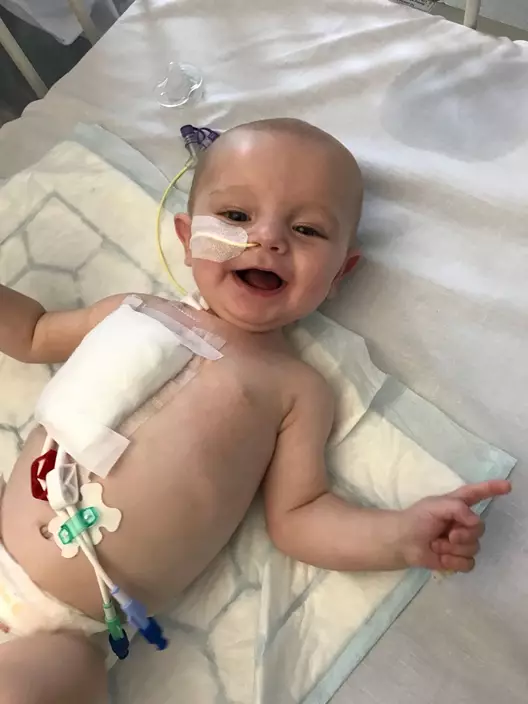
Milo in his 'bubble' room (PA Real Life/Collect)
Electrician James donated bone marrow to his son in August, giving the couple hope, but it was not until November 17 – by which time he had lived longer in hospital than out – that he was finally allowed home, just in time for his first Christmas.
Elated Tazmin said: “If you’d told us back in the summer that Milo would be home for Christmas, I wouldn’t have believed you. There were so many hurdles for us to face that it was difficult to allow ourselves to hope – yet here we are.
“This is the best present we could have ever hoped for. Milo is our superhero and we’re going to spoil him rotten this Christmas.”
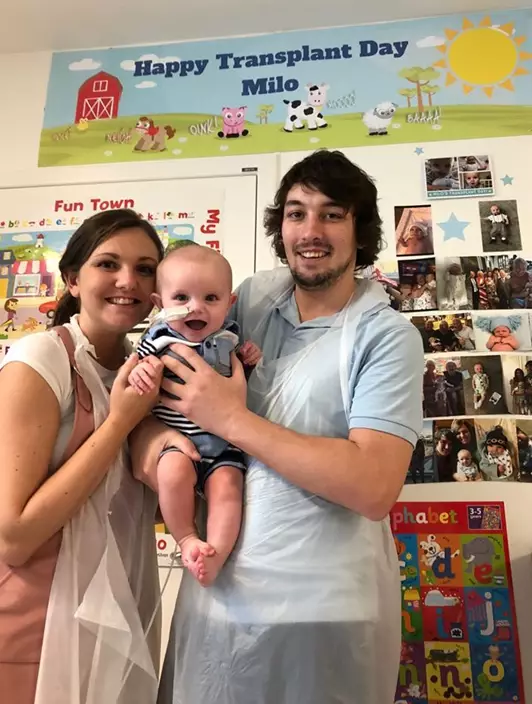
The family on transplant day (PA Real Life/Collect)
When Milo first arrived into the world on 20 February this year, he seemed perfectly healthy and, with his heart-melting grin, Tazmin and James could not have been more in love with him.
But, at around two months old, he developed a cough.
Initially, doctors thought it was a harmless bug that would clear up on its own – but it lingered until Milo’s three month check-up, when health visitors noticed his weight gain had slowed.
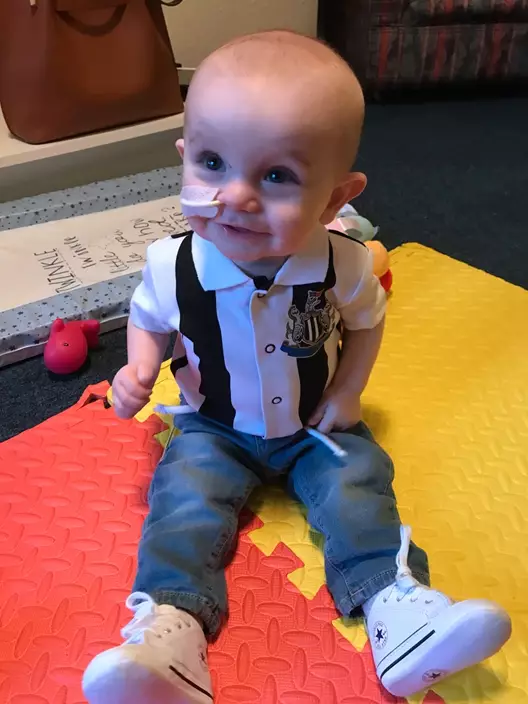
Milo just before he left hospital (PA Real Life/Collect)
In addition, he suddenly stopped taking his bottle, having been a good feeder before.
Anxious, Tazmin and James rang NHS 111, the non-emergency number, and were advised to go to Hull Royal Infirmary.
There, doctors performed a string of tests, thinking he could have anything from a chest infection to reflux, where a baby spits up shortly after feeding.
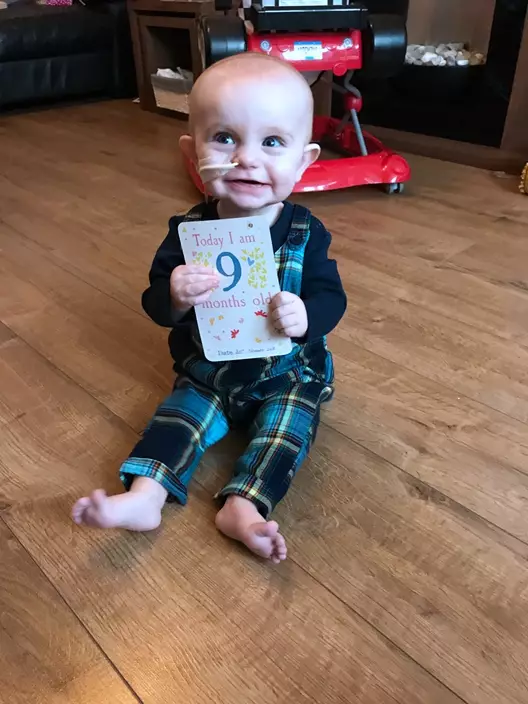
Milo back home (PA Real Life/Collect)
Eventually, after three days, they broke the news that Milo had SCID.
According to the NHS, SCID is caused by a genetic mutation, and means that specialised white blood cells, which usually form the immune system, are either missing or not functioning properly.
In the past, most affected babies would not survive beyond a year, but modern treatments can now either reduce the risk of infection, or cure it completely.
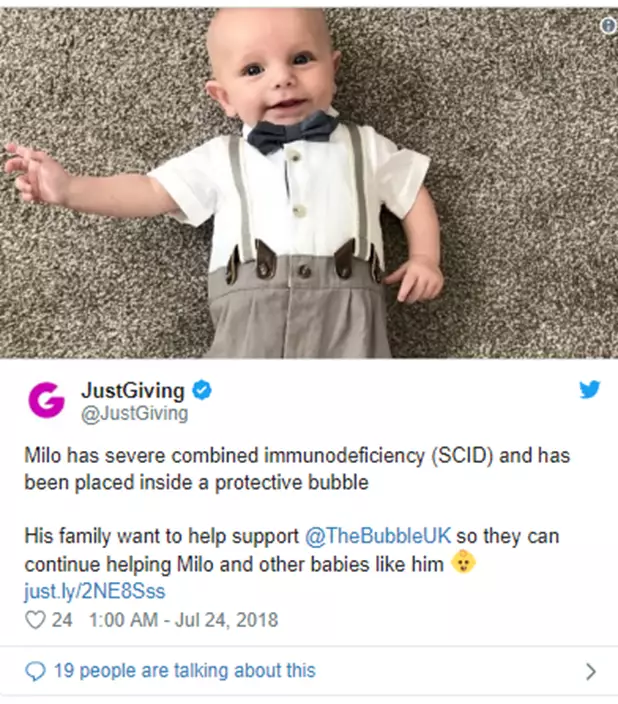
“Because it’s so rare, there are only two hospitals in the UK that could treat Milo – London’s Great Ormond Street, or Great North Children’s Hospital in Newcastle-Upon-Tyne,” explained Tazmin.
“We were transferred right away to Newcastle, 150 miles from home, with no idea how long we’d be there.”
Right away, Milo was admitted to a specialist ward known as the ‘bubble ward,’ because of its individual high-tech sterile rooms, designed to protect patients from infection.
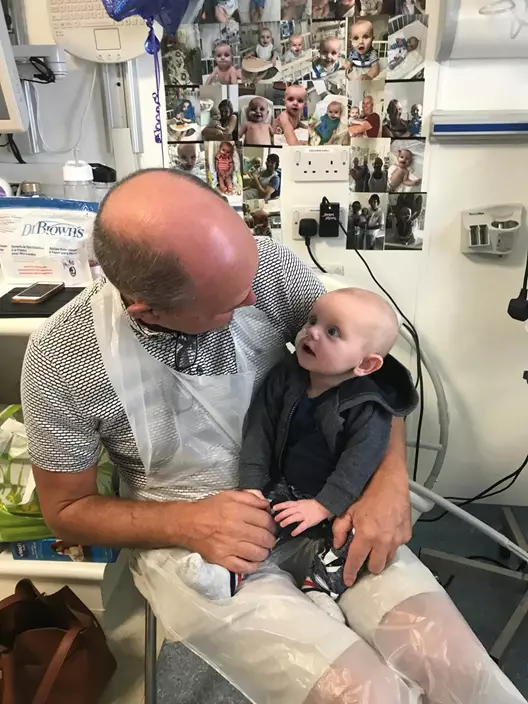
Milo being cuddled by his granddad for the first time in months (PA Real Life/Collect)
Tazmin continued: “We had one last kiss with him and had no idea when we’d be able to do that again. That was incredibly hard. I just broke down.
“You’re only allowed a set number of carers who can enter the room itself, so a lot of our family couldn’t physically touch Milo for months.
“We had to wash all his clothes and toys every night, and disinfect everything. We washed our hands about three of four times, all the way up to the elbows, before being allowed in. We could touch him, but had to make sure he didn’t touch our faces. Worst of all, we couldn’t kiss him.”
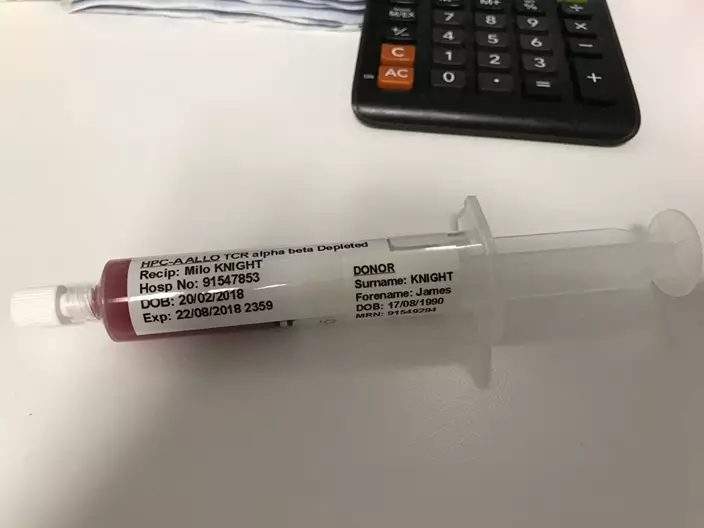
The stem cells James donated (PA Real Life/Collect)
Thankfully, though the family worried when doctors told them Milo’s only chance of a cure was a bone marrow transplant, James was soon found to be a match.
Medics were even able to remove any potentially harmful cells from his bone marrow before transplanting it.
But Milo still had to spend three months in the isolation unit to ensure he was strong enough, and to keep him away from any infections, before having the procedure, which finally happened in August 2018.
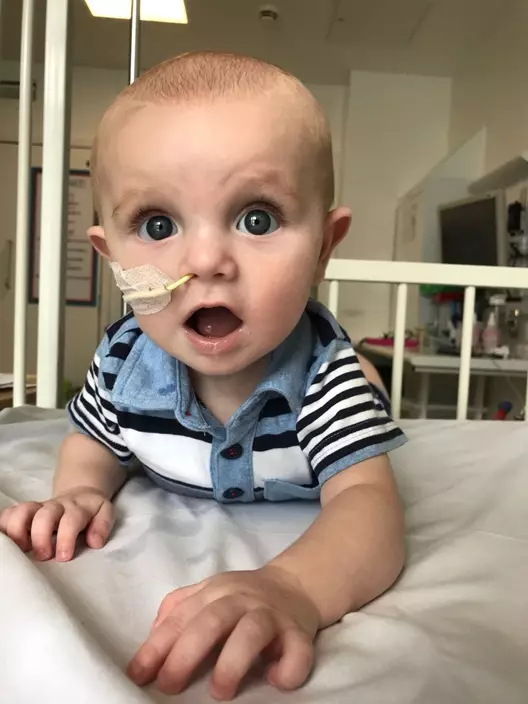
Milo in the isolation unit (PA Real Life/Collect)
A month later, the family were discharged from the ward to a nearby ‘halfway house,’ so the brave tot could still be closely monitored.
“Slowly, we could go back out exploring together,” said Tazmin. “Milo loves being in the fresh air. The first time we went out, I think he’d almost forgotten what the world looks like.
“He was gazing around, taking it all in. Now, he loves being in the fresh air.”

Tazmin, James and Milo on a day out to see the Angel of the North (PA Real Life/Collect)
Worryingly, Milo faced a setback after being hospitalised with an infection and suffering with rotavirus, the most common cause of diarrhoea in infants, which made it difficult for him to gain weight.
“It was all one big waiting game,” said Tazmin. “We desperately wanted him home, but he had to be strong enough and we had to make sure all his care was properly organised, as he would still need a lot of help outside of hospital.”
Finally, after what felt like a lifetime, on Friday 16 November, Milo had his central line – a narrow, flexible, hollow tube inserted into a large vein in the neck, upper chest or groin to help anaesthetists measure the blood pressure – removed.
The following day, doctors said the words Tazmin and James had been longing to hear – ‘You can go home.’
“The drive was so surreal. Milo has lived longer in hospital in Newcastle than he did back home in Hull, so it was almost emotional leaving,” said Tazmin. “When we pulled up at our house, our loved ones had decorated it with banners and bunting. It was an amazing moment.
“We worried he’d struggle to adjust, but he’s his happy little self. James and I are much more relaxed and I think that’s rubbing off on him.”

The house the day Milo came home (PA Real Life/Collect)
While Milo’s immune system is still not fully functional and the family must take great care to keep him away from infections, they are hoping to give him an unforgettable Christmas.
Tazmin continued: “We want him to do all the things other children do, like go see Santa and the Christmas lights. We may just need to go a different way about it, as it’s still not good for him to be around large crowds with lots of people and germs.
“We’re going to have all the family over on Christmas day, which we can’t wait for. I felt a lot of guilt at him being so far away for so long – December 25 is going to be an emotional day for us.”
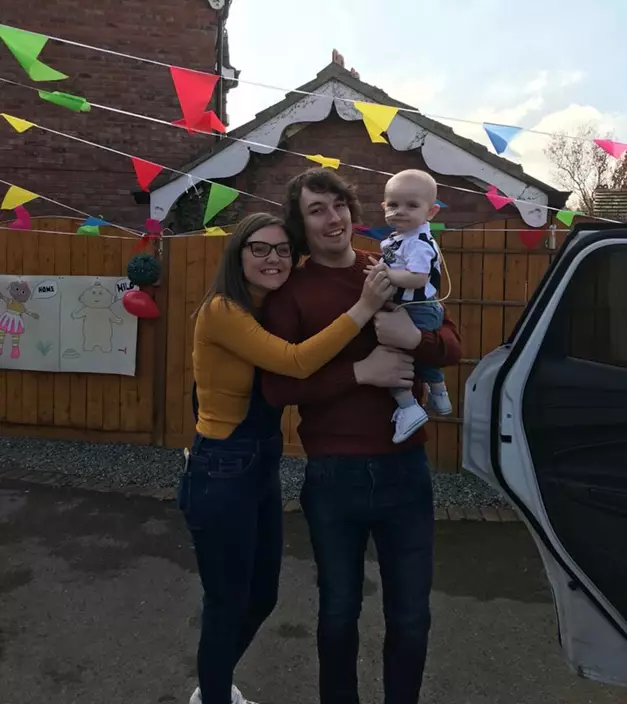
Tazmin, James and Milo on the day he came home (PA Real Life/Collect)
Tazmin and James have also set up a JustGiving page to raise money for The Bubble Foundation, who provide equipment and fund vital research.
Touchingly, their loved ones have formed a group called Milo’s Knights, putting on all sorts of fundraising events – and England cricketer Ben Stokes has even donated to the cause.
“The Bubble Foundation is incredible. They helped us so much, and we want to give something back,” said Tazmin, adding that, to date, £9,000 has been raised.”
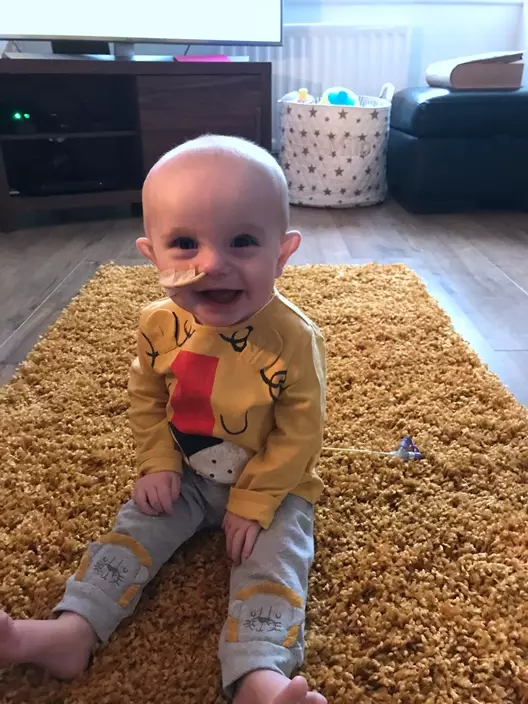
Milo is home in time for Christmas (PA Real Life/Collect)
She added: “It was hard to see the light at the end of the tunnel, but we want to tell other parents to just keep looking forward to the positives. Milo was so brave throughout. He’s made of strong stuff.”
To donate, visit www.justgiving.com/crowdfunding/milos-knights


